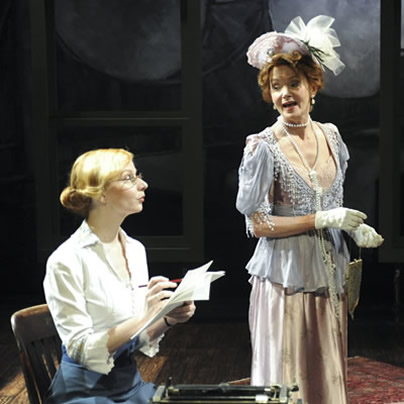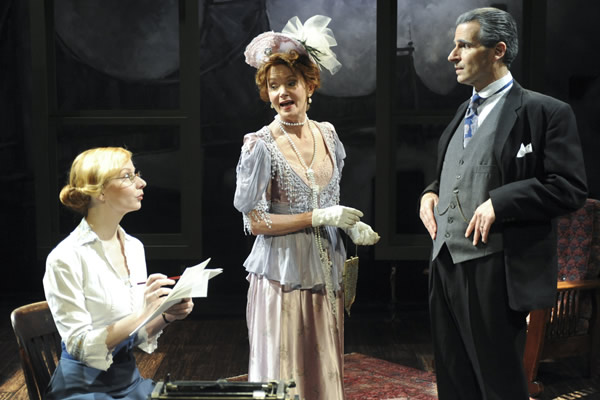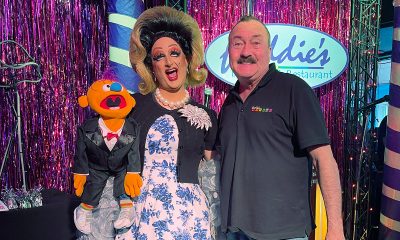Arts & Entertainment
Typing and telepathy
Charming drama poses death as mere inconvenience


From left, Susan Lynskey, Helen Hedman and Paul Morella in ‘Ghost-Writer.’ (Photos by Christopher Banks; courtesy MetroStage)
‘Ghost-Writer’
Through June 16
MetroStage
1201 North Royal Street Alexandria
$45-$55
800-494-8497
metrostage.org
It’s not every day that a respectable secretary with a talent for punctuation becomes fodder for New York City’s tabloid press, but in Michael Hollinger’s 2010 drama “Ghost-Writer” (now at MetroStage) that’s just what happens.
When popular novelist Franklin Woolsey (Paul Morella) drops dead in the middle of dictating his latest book, loyal typist Myra Babbage (Susan Lynskey) forges ahead, channeling her beloved boss’ words from the beyond. While Myra’s unorthodox approach to wrapping things up is a hit with Woolsey’s editor and the curious public, the novelist’s jealous widow is none too thrilled.
Set in 1919 Manhattan, the odd workplace tale unfolds in Woolsey’s comfortable but unpretentious studio. Myra is seated at her typing table facing an unseen investigator (the audience). In wordy monologue and flashbacks she relays just how she came to be a literary medium.
Fresh out of secretarial school, Myra’s hired to take dictation from the businesslike Woolsey. A whiz at the clunky manual typing machine, she never misses a word. As weeks become months and then years, she respectfully but firmly corrects his punctuation and eerily develops the ability to anticipate his prose. The process moves to the outskirts of collaboration, and a close but chaste relationship evolves. There is no longer any mention of Thursday night dance classes or potential husbands. As Myra becomes more heavily immersed in Woolsey and his work, outside distractions fade away. Her focus narrows.
Occasionally the formidable and fashionably turned out Mrs. Woolsey (Helen Hedman) pays unannounced visits to her husband’s studio. A dilettante poet who once transcribed her husband’s novels by hand, she resents her husband’s secretary. After all it is Myra with whom Woolsey spends the lion’s share of his waking hours. And while she finds some comfort that Myra is less pretty than her predecessor, Mrs. Woolsey would still rather she go away. But Myra isn’t cowed; the studio is her domain and Woolsey belongs partly to her too.
“Ghost-Writer” is cleanly staged by John Vreeke (who is gay). In lesser hands, this delicately rendered memory play/ghostly mystery/love story might be a sappy mishmash, but Vreeke’s direction is insightfully keen and well-ordered and his outstanding three-person cast gives thoughtful, restrained performances. He’s also assembled a particularly cohesive design team. Together Alexander Keen’s evocative lighting, Jane Fink’s suggestion of walls and Robert Garner’s distant dance class music and steam whistle from the East river, play beautifully to the concepts of memory and the metaphysical.
At first glance, Lynskey’s Myra is the picture of no-nonsense practicality — pulled back hair and plain attire. But keep looking and you’ll detect a sly smile and twinkly eye behind the steel-rimmed spectacles; her character is no mere typing automaton. Her Myra has an inner world filled with romance and the flourishes of art and music. For her, awaiting Woolsey’s next utterance is an exquisite pleasure. Typing each page is an adventure. Lynskey captures all the layers.
Morella is terrific as Woolsey. He affectively melts from brusque boss to kindly colleague. And as Mrs. Woolsey, Hedman is a marvelous balance of overbearing and vulnerable. It’s a touching performance.
“Ghost Writer” is inspired by the real life happenings of famed gay novelist Henry James and his longtime secretary Theodora Bosanquet. Like Myra, the devoted Bosanquet did what she could to keep the literary master’s words flowing. Unlike Myra, she didn’t hold a torch for her boss. Bosanquet reportedly preferred women.

Team DC, the umbrella organization for LGBTQ-friendly sports teams and leagues in the D.C. area, held its annual Night of Champions Awards Gala on Saturday, April 20 at the Hilton National Mall. The organization gave out scholarships to area LGBTQ student athletes as well as awards to the Different Drummers, Kelly Laczko of Duplex Diner, Stacy Smith of the Edmund Burke School, Bryan Frank of Triout, JC Adams of DCG Basketball and the DC Gay Flag Football League.
(Washington Blade photos by Michael Key)




















The 2024 National Cannabis Festival was held at the Fields at RFK Stadium on April 19-20.
(Washington Blade photos by Michael Key)
















Covering the @NatlCannaFest at RFK Stadium for @WashBlade . Stop by the LGBTQ+ booth and pick up a paper if you are here. pic.twitter.com/is7hnsaPns
— Michael Patrick Key (@MichaelKeyWB) April 20, 2024
Theater
‘Amm(i)gone’ explores family, queerness, and faith
A ‘fully autobiographical’ work from out artist Adil Mansoor

‘Amm(i)gone’
Thorough May 12
Woolly Mammoth Theatre
641 D St., N.W.
$60-$70
Woollymammoth.net
“Fully and utterly autobiographical.” That’s how Adil Mansoor describes “Amm(i)gone,” his one-man work currently playing at Woolly Mammoth Theatre.
Both created and performed by out artist Mansoor, it’s his story about inviting his Pakistani mother to translate Sophocles’s Greek tragedy “Antigone” into Urdu. Throughout the journey, there’s an exploration of family, queerness, and faith,as well as references to teachings from the Quran, and audio conversations with his Muslim mother.
Mansoor, 38, grew up in the suburbs of Chicago and is now based in Pittsburgh where he’s a busy theater maker. He’s also the founding member of Pittsburgh’s Hatch Arts Collective and the former artistic director of Dreams of Hope, an LGBTQ youth arts organization.
WASHINGTON BLADE: What spurred you to create “Amm(i)gone”?
ADIL MANSOOR: I was reading a translation of “Antigone” a few years back and found myself emotionally overwhelmed. A Theban princess buries her brother knowing it will cost her, her own life. It’s about a person for whom all aspirations are in the afterlife. And what does that do to the living when all of your hopes and dreams have to be reserved for the afterlife?
I found grant funding to pay my mom to do the translation. I wanted to engage in learning. I wanted to share theater but especially this ancient tragedy. My mother appreciated the characters were struggling between loving one another and their beliefs.
BLADE: Are you more director than actor?
MANSOOR: I’m primarily a director with an MFA in directing from Carnegie Mellon. I wrote, directed, and performed in this show, and had been working on it for four years. I’ve done different versions including Zoom. Woolly’s is a new production with the same team who’ve been involved since the beginning.
I love solo performance. I’ve produced and now teach solo performance and believe in its power. And I definitely lean toward “performance” and I haven’t “acted” since I was in college. I feel good on stage. I was a tour guide and do a lot of public speaking. I enjoy the attention.
BLADE: Describe your mom.
MANSOOR: My mom is a wonderfully devout Muslim, single mother, social worker who discovered my queerness on Google. And she prays for me.
She and I are similar, the way we look at things, the way we laugh. But different too. And those are among the questions I ask in this show. Our relationship is both beautiful and complicated.
BLADE: So, you weren’t exactly hiding your sexuality?
MANSOOR: In my mid-20s, I took time to talk with friends about our being queer with relation to our careers. My sexuality is essential to the work. As the artistic director at Dreams of Hope, part of the work was to model what it means to be public. If I’m in a room with queer and trans teenagers, part of what I’m doing is modeling queer adulthood. The way they see me in the world is part of what I’m putting out there. And I want that to be expansive and full.
So much of my work involves fundraising and being a face in schools. Being out is about making safe space for queer young folks.
BLADE: Have you encountered much Islamophobia?
MANSOOR: When 9/11 happened, I was a sophomore in high school, so yes. I faced a lot then and now. I’ve been egged on the street in the last four months. I see it in the classroom. It shows up in all sorts of ways.
BLADE: What prompted you to lead your creative life in Pittsburgh?
MANSOOR: I’ve been here for 14 years. I breathe with ease in Pittsburgh. The hills and the valleys and the rust of the city do something to me. It’s beautiful, it’ affordable, and there is support for local artists. There’s a lot of opportunity.
Still, the plan was to move to New York in September of 2020 but that was cancelled. Then the pandemic showed me that I could live in Pittsburgh and still have a nationally viable career.
BLADE: What are you trying to achieve with “Amm(i)gone”?
MANSOOR: What I’m sharing in the show is so very specific but I hear people from other backgrounds say I totally see my mom in that. My partner is Catholic and we share so much in relation to this.
I hope the work is embracing the fullness of queerness and how means so many things. And I hope the show makes audiences want to call their parents or squeeze their partners.




















